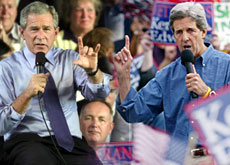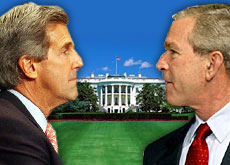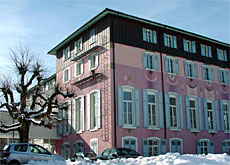Swiss money funds US presidential elections

The United States election campaign is being closely followed, and funded, not only by the American people, but also by Swiss companies with interests in the US.
For Swiss firms, financial considerations play a major part in the decision to support George Bush or John Kerry.
The final stage of the race for the White House is underway, and will end with the election on November 2.
A lively interest in the outcome is evident in Switzerland, not only on the part of American expatriates, but also from Swiss firms trading in American markets.
“For some years, Swiss firms and groups of companies have been funding both the rival parties,” said Stefano Modenini, head of the Swiss Business Federation, economiesuisse, in Ticino.
Tax relief
The financial strategy adopted by Bush has created a favourable climate for business investment.
If re-elected, the incumbent president could well bring further joy to financial institutions by fulfilling his promise to lighten the tax burden on high-income earners – a move very much in the interests of the major banks.
According to figures provided by the Center for Responsive Politics (CRP), the US division of Swiss bank UBS (UBS Americas) has so far donated an estimated SFr2.4 million ($1.9 million) in support of Republican candidates. This includes funding for candidates in elections to Congress and state governorships, as well as the presidential elections.
In the rankings drawn up by the CRP, a body that monitors election campaign funding and spending, UBS is the fifth largest contributor to the Republican Party in the financial sector.
“We are closely monitoring developments in the presidential election campaign, but we are not expressing any preference,” said Christoph G. Meier, UBS spokesman in Zurich.
Credit Suisse First Boston (CSFB) meanwhile ranks 14th, having contributed SFr1.8 million (56 per cent of it in aid of the Republicans).
Does this mean that the Swiss banking institution hopes Bush will be re-elected? The Credit Suisse spokesman preferred not to comment.
John Kerry, on the other hand, is in danger of acquiring a “spoilsport” image: his declared intention is to increase taxation on incomes over $200,000.
Energy and pharmaceuticals
Were he to become the next occupant of the Oval Office, Kerry has promised to invest more heavily in infrastructure and improve safety in the electricity distribution industry.
Such a policy would undoubtedly be in the interests of the Swiss/Swedish ABB group, a leader in the field of energy-related technology, with a turnover in the US in excess of SFr3 billion.
However, ABB has contributed less than half (44.2 per cent) of its funding for the presidential elections to the Democratic Party.
Could this be because developments in this sector will depend more on new energy legislation, which will not be debated until after the elections?
While Bush – good Texan that he is – looks to a future fuelled by oil, Kerry is in favour of developing renewable energy sources and reducing energy consumption.
In the pharmaceuticals sector, the aspect Swiss companies are most concerned about is changes in the pricing of medicines.
While Bush is not inclined to intervene and impose price controls – so as not to discourage research – Kerry is in favour of taking corrective action, and at the same time encouraging imports of cheaper products, for example from Canada.
Looking through the list of donors, it is therefore not surprising to find Novartis lending more support to the incumbent president, contributing 73 per cent of its campaign funding (out of a total of SFr340,000) to Bush.
Expensive campaign
It is difficult to grasp the true significance of these percentages. While a company’s prosperity depends on the economic potential of the market in which it is trading, it also depends on other factors, such as the availability of qualified personnel.
The fact remains that this year’s campaign is the most expensive in American history.
By the middle of September, SFr427 million had already flowed into George W. Bush’s war chest, as against SFr395 million for John Kerry (though the latter figure also includes public contributions, which Bush has renounced).
Four years ago, Bush amassed only – if “only” is the right word – SFr245 million.
swissinfo, Luigi Jorio
(with Anna Luisa Ferro Mäder in Washington)
By the middle of September, SFr822 million ($687 million) had been donated to fund the candidates in the 2004 presidential elections.
In the 2000 campaign, George W. Bush managed to gather SFr245 million.
The corresponding figure for his Democratic rival, Al Gore, was SFr167 million.
US law does not allow companies to provide direct funding for political parties in election campaigns.
However, supporters are free to make contributions to so-called Political Action Committees.
These are organisations set up by private companies, trade unions, professional associations and other groups, with the purpose of raising funds from their members and employees.

In compliance with the JTI standards
More: SWI swissinfo.ch certified by the Journalism Trust Initiative



You can find an overview of ongoing debates with our journalists here . Please join us!
If you want to start a conversation about a topic raised in this article or want to report factual errors, email us at english@swissinfo.ch.